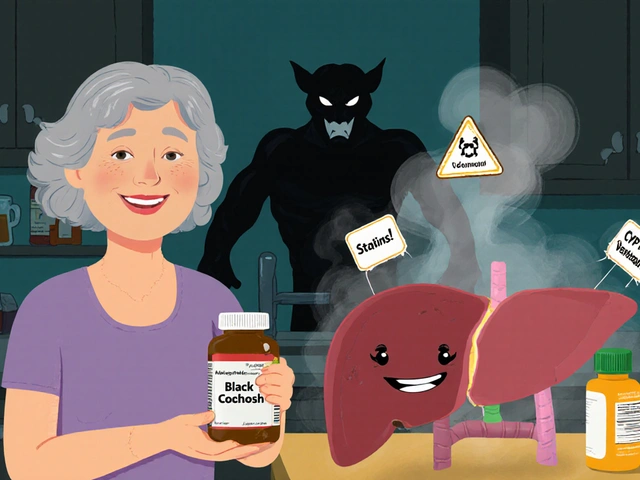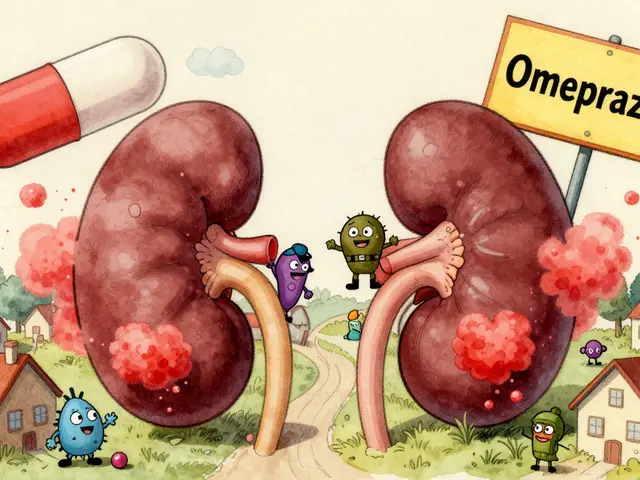Introduction: Understanding Amebiasis and Colon Cancer
Amebiasis and colon cancer are two different conditions that affect the large intestine. While they have distinct causes and symptoms, recent research has suggested a potential connection between these two diseases. In this article, we will explore the possible links between amebiasis and colon cancer, shedding light on how these conditions may be related and what this could mean for prevention and treatment efforts.
What is Amebiasis?
Amebiasis is an infection caused by the parasite Entamoeba histolytica, which primarily affects the large intestine. This parasite can cause a wide range of symptoms, ranging from mild diarrhea to severe dysentery with bloody stools. Amebiasis is often contracted through contaminated food or water, and it is most common in developing countries with poor sanitation. If left untreated, the infection can spread to other organs, such as the liver, and cause life-threatening complications.
Understanding Colon Cancer
Colon cancer, also known as colorectal cancer, is the third most common type of cancer worldwide. It develops in the large intestine, usually starting as small, benign growths called polyps. Over time, these polyps can become cancerous and spread to other parts of the body. Common symptoms of colon cancer include changes in bowel habits, such as diarrhea or constipation, blood in the stool, abdominal pain, and unexplained weight loss. Early detection and treatment are crucial for improving the chances of survival.
The Link between Amebiasis and Colon Cancer: Inflammation
One possible connection between amebiasis and colon cancer is the role of inflammation in both conditions. In amebiasis, the parasite Entamoeba histolytica causes damage to the intestinal lining, leading to inflammation. Similarly, chronic inflammation has been identified as a significant risk factor for the development of colon cancer. Researchers believe that the inflammatory response triggered by the amebiasis infection could potentially contribute to the formation of cancerous cells in the colon.
The Role of Immune Response
Another potential link between amebiasis and colon cancer relates to the immune response. During an amebiasis infection, the body's immune system works to eliminate the parasite and repair the damage it has caused. However, this immune response can also contribute to inflammation and tissue damage, potentially increasing the risk of colon cancer. Moreover, some studies have shown that the immune response in individuals with a history of amebiasis may be altered, potentially making them more susceptible to developing cancer later in life.
Genetic Factors: Are Some Individuals More Susceptible?
Genetic factors may also play a role in the potential connection between amebiasis and colon cancer. Some individuals may have a genetic predisposition to developing colon cancer, and this risk may be further increased by the presence of an amebiasis infection. While more research is needed to fully understand this relationship, it is crucial to consider the potential impact of genetic factors when examining the links between these two conditions.
Amebiasis as a Risk Factor for Colon Cancer
Given the potential connections between amebiasis and colon cancer, it is essential to consider whether amebiasis could be a risk factor for the development of colon cancer. While more research is needed to confirm this association, some studies have suggested that individuals with a history of amebiasis may have an increased risk of developing colon cancer. If this is the case, it would be crucial to develop strategies for early detection and treatment of amebiasis in order to reduce the risk of colon cancer.
Prevention: Reducing the Risk of Amebiasis and Colon Cancer
Understanding the potential connection between amebiasis and colon cancer highlights the importance of prevention. To reduce the risk of amebiasis, it is essential to practice good hygiene, such as handwashing, and to avoid consuming contaminated food or water, especially in areas with poor sanitation. To reduce the risk of colon cancer, it is recommended to maintain a healthy lifestyle, including a balanced diet, regular exercise, and avoiding tobacco and excessive alcohol consumption. Additionally, regular screening for colon cancer can help detect the disease in its early stages, improving the chances of successful treatment.
Treatment Options: Addressing Amebiasis and Colon Cancer
If a connection between amebiasis and colon cancer is established, it could have implications for the treatment of both conditions. Treating amebiasis typically involves the use of anti-parasitic medications, and early treatment is crucial to prevent complications and reduce the risk of colon cancer. In the case of colon cancer, treatment options include surgery, chemotherapy, radiation therapy, and targeted therapies. If a link between amebiasis and colon cancer is confirmed, it could potentially lead to the development of new treatment strategies that target both the parasite and cancerous cells.
Conclusion: The Importance of Further Research
While the potential connection between amebiasis and colon cancer is intriguing, more research is needed to fully understand this relationship and its implications for prevention and treatment. By continuing to investigate the links between these two conditions, we can work towards developing more effective strategies to reduce the risk of both amebiasis and colon cancer and improve the outcomes for those affected by these diseases.






Stay healthy and keep washing those hands! 🙌
I notice you never mention the sanitation standards in developing countries, which feels a bit off. It’s like you’re glossing over the root of the problem.
While your point is noted, the sentence structure could be improved. Specifically, “never mention” should be “never mention the”. Also, consider using a comma after “countries”. These minor edits enhance clarity.
The parasite, though microscopic, forces humanity to confront its own fragility. When Entamoeba histolytica breaches the mucosal barrier, it does more than cause diarrhea; it reveals how intertwined life and death truly are. Inflammation, the body's alarm system, becomes a double‑edged sword, defending yet potentially laying the groundwork for malignancy. Each cell damaged by the parasite may emit signals that linger long after the infection clears, whispering to neighboring cells about danger. Over time, those whispers can become a chorus, urging unchecked proliferation. The colon, constantly renewing its lining, is especially vulnerable to such persistent murmurs. If we imagine the gut as a city, amebiasis is an invading force that rattles the infrastructure, leaving potholes that traffic (cells) later exploits. Those potholes, if not repaired, become avenues for criminal activity-in this case, uncontrolled growth. The immune system, in its zeal, may inadvertently sculpt the very landscape that a tumor needs to thrive. Moreover, genetic predispositions act like pre‑existing cracks, making the damage more severe. Thus, the connection between infection and cancer is not merely coincidental; it is a narrative of cause and effect written in our biology. Recognizing this script invites us to rewrite the ending, perhaps by intervening early. Screening for amebiasis, especially in high‑risk regions, could act as a preventive checkpoint before the story turns tragic. Ultimately, the lesson is humble: microscopic battles can echo in macroscopic outcomes. By listening to these echoes, science may one day block the path from parasite to tumor.
Wow-what a fascinating intersection of microbiology and oncology! 🎉 The idea that a single‑celled parasite could light the fuse for colon cancer is both terrifying and awe‑inspiring. It reminds us that every pathogen carries a story that may ripple through decades of our health. Let’s dive deeper into the mechanisms, because understanding inflammation’s role could unlock new preventive strategies. Keep the research coming; the more we know, the better we can protect ourselves! 😊
Oh, brilliant-because “awesome” research always means immediate cures, right? In reality, saying “let’s dive deeper” doesn’t magically solve the underlying methodological gaps. One would expect a more rigorous critique rather than a feel‑good rally. Nonetheless, kudos for the enthusiasm.
While the enthusiasm is noted, the assertion that a parasitic infection may act as a direct etiological factor for colorectal malignancy requires substantiation through longitudinal cohort studies. Moreover, the proposed mechanistic pathways must be delineated with molecular precision, including cytokine profiling and genomic alterations. Absent such data, speculative correlations risk misinforming clinical guidelines.
Great job pulling together the current evidence, everyone! It really helps to see the big picture laid out in plain language. If you’re looking for ways to reduce risk, remember simple steps like drinking filtered water and staying up to date on colonoscopies. Also, incorporating fiber‑rich foods can support gut health and possibly mitigate chronic inflammation. Keep sharing these insights!
It is incumbent upon the medical community to prioritize preventative measures, especially in regions where sanitation is compromised. Neglecting to address amebiasis as a potential carcinogenic risk borders on ethical irresponsibility. Therefore, public health policies must integrate parasite control with cancer screening programs.
Some argue that the focus on amebiasis is a distraction, designed to keep us from seeing the larger agenda of pharmaceutical control over cancer treatments. The narrative conveniently pushes us toward costly therapies instead of addressing simple sanitation issues that could reduce both infection and cancer rates.
Man, i cant believe how many folks just brush off this whole parasite‑cancer link. It's like they're scared to admit that something as simple as a dirty water source could be messing up our guts big time. If we dont start takin this seriously, the numbers are gonna blow up faster than anyone expects. Get real, get clean.
Hey, I hear you, and you're absolutely right-this is a wake‑up call we can’t ignore! As someone who’s worked on gut‑microbe interactions, I’ve seen firsthand how chronic inflammation sets the stage for malignancy. Let’s channel that frustration into action: advocate for clean water initiatives, support community screenings, and push for more funding into this research niche. Together, we can turn the tide and protect countless lives.
From a translational oncology perspective, the hypothesized amebiasis‑induced oncogenic cascade warrants a comprehensive systems‑biology approach, integrating metagenomic sequencing, cytokine storm modeling, and KRAS/TP53 mutational mapping. Without such integrative analytics, any claim of causality remains speculative at best. Therefore, the discourse must elevate beyond anecdotal enthusiasm and adopt rigorous, data‑driven frameworks.